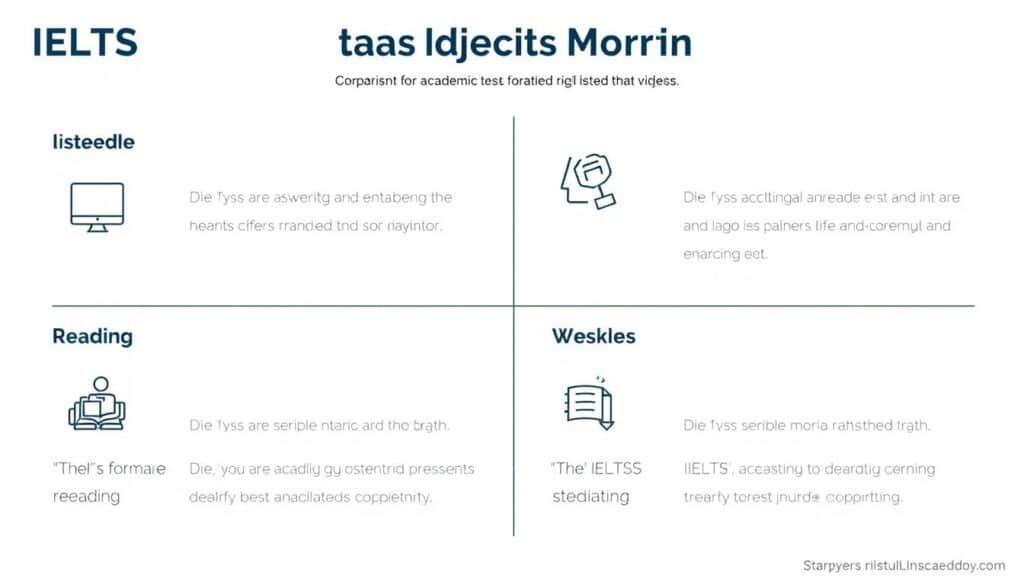Are you planning to pursue higher education or seek professional opportunities in English-speaking countries? The IELTS Academic test is a crucial step in that journey. Designed for those aiming to study, work, or immigrate, this test evaluates your ability to communicate in academic English.
The IELTS Academic test is specifically tailored for individuals seeking admission to universities or professional registration. It measures your proficiency in four key areas: Listening, Reading, Writing, and Speaking. Whether you’re applying to a university in the United States or another English-speaking country, this test is essential for demonstrating your readiness for academic challenges.
In this comprehensive guide, we’ll walk you through everything you need to know about the IELTS Academic test. From booking your test to understanding the differences between IELTS Academic and General Training, we’ve got you covered. We’ll also provide expert tips on preparation, including strategies for both paper-based and computer-based formats. Plus, we’ll highlight the importance of proper identification, such as your passport, when registering for the test.
Key Takeaways
- The IELTS Academic test is designed for higher education and professional opportunities.
- It assesses Listening, Reading, Writing, and Speaking skills in an academic context.
- Proper identification, like a passport, is required for test registration.
- This guide covers test booking, fees, preparation tips, and format differences.
- Understanding the differences between IELTS Academic and General Training is crucial for test-takers.
what is ielts academic: Understanding the Test
Preparing for the IELTS Academic test is a significant step for those aiming to study or work in English-speaking countries. This test is designed to assess your readiness for the challenges of academic environments.
Overview of the IELTS Academic Test
The IELTS Academic test evaluates four main skills: Listening, Reading, Writing, and Speaking. It’s tailored for individuals seeking admission to universities or professional registration. The test content includes passages from books, magazines, and newspapers, reflecting real academic scenarios.
Differences from IELTS General Training
While both tests share the same Listening and Speaking sections, the Reading and Writing sections differ significantly. IELTS Academic focuses on academic language, while General Training emphasizes everyday English. The Writing section in Academic requires analytical tasks, such as interpreting graphs, whereas General Training involves writing letters on everyday topics.
| Aspect | IELTS Academic | IELTS General Training |
|---|---|---|
| Purpose | Higher education and professional registration | Work, immigration, and secondary education |
| Reading Content | Passages from books, journals | Everyday materials like ads, brochures |
| Writing Tasks | Analyzing data, academic essays | Writing letters and informal essays |
“Choosing the right test version is crucial. IELTS Academic is for those ready to engage with complex academic texts and tasks, while General Training suits individuals needing everyday English skills for work or immigration purposes.”
In summary, IELTS Academic is designed for academic and professional environments, focusing on complex language and analytical tasks. Understanding these differences helps test-takers choose the right path for their goals.
Test Format and Structure
Understanding the structure of the IELTS Academic test is essential for effective preparation. The test is divided into four sections: Listening, Reading, Writing, and Speaking. Each section evaluates different skills, ensuring a comprehensive assessment of your English proficiency.
Listening, Reading, Writing, and Speaking Components
The Listening section lasts 30 minutes, featuring 40 questions across four recorded conversations. You’ll have an additional 10 minutes to transfer your answers. The Reading section includes three passages with 40 questions, to be completed in 60 minutes. The Writing section consists of two tasks: describing a graph or chart (Task 1) and writing an essay (Task 2), with a total of 60 minutes. The Speaking test is an 11- to 14-minute face-to-face discussion with an examiner, divided into three parts.
Paper-Based vs. Computer-Based Options
| Format | Paper-Based | Computer-Based |
|---|---|---|
| Test Administration | Traditional paper format with answer sheets. | Completed on a computer; same content but with on-screen questions. |
| Listening Section | Audio played via CD or recording; answers written on paper. | Audio played through computer headphones; answers typed or marked on-screen. |
| Reading & Writing | Questions and answers completed on paper. | Questions viewed on-screen; answers typed directly. |
| Speaking | Conducted face-to-face with an examiner. | Same as paper-based; no online option. |
| Test Timing | 2 hours 45 minutes (includes transfer time for Listening). | 2 hours 45 minutes (no transfer time needed). |
Both formats maintain the same test content and timing, ensuring fairness regardless of your chosen method. Familiarizing yourself with the format reduces exam-day anxiety and helps you perform your best. Whether you prefer the traditional paper-based approach or the convenience of computer-based testing, the IELTS Academic test is designed to fairly evaluate your academic English skills.
For more detailed information on test preparation and strategies, visit our IELTS preparation resources page.
Booking Your Test and Key Preparation Requirements
Once you’ve decided to take the IELTS Academic test, the next step is to book your test and prepare the necessary documents. This section will guide you through the process of finding a test center, preparing your identification, and completing your registration.
Finding Your Nearest IELTS Test Centre
Locating a test center is the first step in the booking process. Visit the official IELTS website to find the nearest test center in your area. You can search by country or city to find a list of available centers. Once you’ve found a center, check their available test dates and choose one that fits your schedule.
Identification and Passport Guidelines
A valid passport is required for test registration. Ensure your passport is up to date and that you have a clear, legible copy to upload during the booking process. The passport must be the same one you’ll use on test day. If you’re unable to find a test center or have questions about the process, contact the IELTS Australasia Contact Centre for assistance.
The online booking process is straightforward. Visit the official IELTS website, select your test center, and choose a test date. You’ll need to upload a scanned copy of your passport and fill in your personal details. After submitting your application, you’ll receive a confirmation email with further instructions.
For additional information or support, you can contact your local test center or visit the IELTS website. Following these steps ensures a smooth registration process and helps you avoid last-minute issues on test day. Remember to confirm test center availability in your country before finalizing your booking.
By following these guidelines, you’ll be well-prepared for the IELTS Academic test and can focus on achieving your academic and professional goals.
Cost, Fees, and Registration Process
Understanding the cost and registration process for the IELTS Academic test is an important part of your preparation journey. The test fee varies by country but remains consistent across both Academic and General Training versions. For example, in Australia, the fee is around $460. This consistency ensures fairness and transparency for all test-takers.
The fee covers all four sections of the test—Listening, Reading, Writing, and Speaking. There are no additional registration or late payment fees, as per the official guidelines. This straightforward pricing helps you plan your budget without unexpected costs.
Registering for the test is a simple process. You can find your nearest test center on the official IELTS website, choose a date, and upload your passport. Payment is made online, and you’ll receive a confirmation email with further instructions. This clear process ensures a smooth experience from start to finish.
Effective Preparation Strategies for IELTS Academic
To excel in the IELTS Academic test, a well-structured preparation plan is essential. Start by accessing official IELTS sample tests and practice materials, which are available on the IELTS website and other reputable sources. These resources provide a clear understanding of the test format and help you familiarize yourself with the types of questions you’ll encounter.
Accessing Sample Tests and Practice Materials
Official practice materials are designed to mirror the actual test experience. They include sample questions, answer keys, and scoring criteria, allowing you to assess your performance accurately. Many of these resources are free or low-cost, making them accessible to all test-takers.
tips for Each Test Section
Listening and Reading: Practice under timed conditions to simulate the actual test environment. Focus on identifying key information quickly and accurately. For the Listening section, listen to various English accents and conversations to improve comprehension. For Reading, practice skimming and scanning passages to locate specific details efficiently.
Writing: Develop a structured approach to tasks. For Task 1, focus on describing charts and graphs clearly and concisely. For Task 2, practice writing essays with a logical structure, using formal language and cohesive linking words. Seek feedback from teachers or mentors to refine your skills.
Speaking: Engage in regular conversations in English to build confidence. Practice responding to common topics and questions, focusing on fluency and clarity. Record yourself to identify areas for improvement and work on pronunciation and intonation.
Consistent practice and review are key to improving your test performance. By dedicating time each day to these strategies, you’ll enhance your skills and boost your confidence for the IELTS Academic test.
Navigating IELTS Online: Flexibility in Testing
Discover how IELTS Online offers a modern, flexible way to take your test from the comfort of your own space. This innovative format is designed to meet the needs of international candidates seeking convenience without compromising on quality.
What to Expect from IELTS Online
The IELTS Online test maintains the same content and structure as the traditional exam. It includes a human-led Speaking test via video call, ensuring an authentic experience. Results are delivered within 6–8 days, providing quick feedback for your next steps.
Comparing Online and Test Centre Experiences
While both formats share the same content, the online test offers unique advantages. You can take it from any location with a stable internet connection, eliminating the need to travel to a test center. The technical requirements are straightforward—just a reliable computer setup and a quiet environment.
The Listening, Reading, and Writing sections are identical to those in the computer-based test. The Speaking test, conducted via video call, ensures a personal touch even in an online setting. This blend of flexibility and human interaction makes IELTS Online an appealing choice for many test-takers.
Booking an IELTS Online test is simple, regardless of your country. The process is streamlined, allowing you to schedule your test effortlessly. With quick results and the convenience of remote testing, IELTS Online provides a hassle-free experience tailored to your needs.
Test Day Experience and Scoring Explained
Understanding what to expect on test day and how your results are calculated is crucial for a smooth experience. This section guides you through the process, from arrival to receiving your results.
Day-of-Test Procedures
The test day begins with check-in, where you’ll present your passport. For paper-based tests, bring a pencil, as pens are not allowed. Electronic devices must be left outside the test room. The Listening, Reading, and Writing sections are completed in one session, while the Speaking test may be scheduled on the same day or within seven days before or after.
Test Sequence:
- Listening (30 minutes)
- Reading (60 minutes)
- Writing (60 minutes)
- Speaking (11-14 minutes)
Understanding Your IELTS Score Report
Your score report, available 13 days after the test, shows band scores for each section and an overall band. Each section is scored from 0-9, with the overall score rounded to the nearest half band. The report also includes your test date and details.
Scoring System:
| Section | Description | Score Range |
|---|---|---|
| Listening | 40 questions, each worth 1 mark | 0-9 |
| Reading | 40 questions, each worth 1 mark | 0-9 |
| Writing | Assessed on task achievement, coherence, vocabulary, and grammar | 0-9 |
| Speaking | Assessed on fluency, vocabulary, grammar, and pronunciation | 0-9 |
Results are reliable and consistent, providing a clear picture of your English proficiency. For more details, visit the IELTS information page.
Conclusion
Mastering the IELTS Academic test opens the door to countless opportunities for higher education and professional growth. This guide has covered everything from understanding the test format to effective preparation strategies, ensuring you’re well-equipped for success.
The key difference between IELTS Academic and General Training lies in their purpose. Academic focuses on academic environments, requiring complex language and analytical tasks, while General Training is geared toward everyday English for work or immigration. Understanding these differences is crucial for choosing the right path.
To excel, utilize official practice materials and follow a structured study plan. Focus on timed exercises for Listening and Reading, develop clear writing strategies, and engage in regular speaking practice. Recording your efforts and seeking feedback can significantly enhance your skills.
On test day, arrive prepared with necessary documents and a clear mind. Familiarize yourself with the format—whether paper-based or computer-based—to reduce anxiety and perform at your best. Understanding the scoring system and logistics ensures a smooth experience.
With dedication and the right approach, you can achieve your desired IELTS score. Take the next step confidently, knowing you’re ready to thrive in an academic or professional setting. Embrace the opportunity to excel in a supportive English language environment and make your goals a reality.
FAQ
How does the IELTS Academic test differ from IELTS General Training?
The IELTS Academic test is designed for higher education and professional registration, focusing on academic language skills. In contrast, IELTS General Training is for immigration, work, and secondary education, emphasizing everyday language use. Both tests share the same Listening and Speaking sections but differ in Reading and Writing tasks.
What is the format of the IELTS Academic test?
The test consists of four sections: Listening, Reading, Writing, and Speaking. The Listening and Reading sections are completed in 40 and 60 minutes, respectively. The Writing section lasts 60 minutes, and the Speaking test is an 11–14 minute interview. You can choose between paper-based or computer-based formats.
How can I book my IELTS Academic test?
Visit the official IELTS website to find your nearest test center. You’ll need a valid passport and to fill out the registration form. Payment methods vary by center, but most accept online payments. Ensure you book your test at least two weeks in advance to secure your preferred date.
What materials should I use to prepare for the test?
Use official IELTS practice materials, such as the Official Cambridge IELTS Practice Books or online resources like Road to IELTS. These materials provide sample tests, tips, and strategies to help you improve your skills in each section.
How are IELTS scores calculated?
Your score is based on your performance in each section, with results ranging from 0 to 9. The overall score is the average of the four sections, rounded to the nearest half or whole band. You’ll receive a Test Report Form with your scores 13 days after the test for paper-based and 5-7 days for computer-based.
Can I take the IELTS Academic test on a computer?
Yes, IELTS offers a computer-based option for Listening, Reading, and Writing. The Speaking section remains face-to-face with an examiner. Computer-based tests offer more flexibility, with results available faster than paper-based tests.
How long are IELTS results valid?
IELTS results are valid for two years. Universities and immigration authorities typically require recent results, so ensure your test date aligns with your application deadlines.
What should I bring on test day?
Bring your valid passport, the confirmation email or letter from the test center, and a pen/pencil for the paper-based test. Arrive at least 30 minutes early to complete check-in and security procedures. Electronic devices are not allowed in the test room.
Can I retake the test if I’m not satisfied with my score?
Yes, you can retake the test as many times as needed. However, it’s recommended to wait and prepare further before re-taking to improve your score. There’s no restriction on how soon you can re-register after your previous test.
How do I prepare for each section of the test?
Focus on improving your reading, writing, listening, and speaking skills. Practice with sample tests, join study groups, and seek feedback from instructors. Time management is crucial, especially for the Writing and Reading sections.
What is the cost of the IELTS Academic test?
Fees vary by country and test center. On average, it costs between 0–0 USD. Check your local test center’s website for exact pricing and additional costs, such as sending score reports to universities.
How can I improve my speaking skills for the test?
Practice speaking regularly with friends or tutors. Record yourself to identify areas for improvement. Focus on fluency, vocabulary, and pronunciation. Use study materials like IELTS Speaking Actual Tests to familiarize yourself with common topics.








